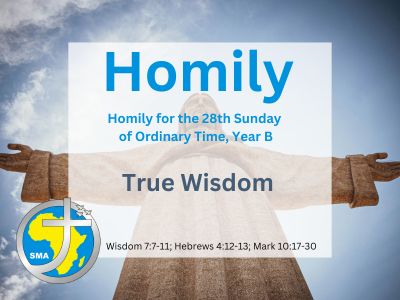Readings: Wisdom 7:7-11; Hebrews 4:12-13; Mark 10:17-30
Theme: True Wisdom
A few days ago I had an interesting conversation with a friend about an underrated virtue today – the virtue of wisdom. Browsing in Waterstones, Cork, my friend had recently come across a fascinating book on Seneca, one of the leading philosophers of ancient Rome. Written by David Fideler, and entitled Breakfast with Seneca: A Stoic Guide to the Art of Living, it offers practical guidance on developing character, cultivating healthy friendships and navigating the vicissitudes of life with equanimity. As my friend discovered, Seneca’s wisdom, as distilled by Fideler, provides us with a rich deposit of time-tested advice about the human condition that is as relevant today as it was two thousand years ago.
The Book of Wisdom, from which our first reading is taken, illustrates the high regard for wisdom in the Ancient world. The author speaks in the name of king Solomon who was reputed to be the wisest man in all of Israel. He states that Solomon prayed for wisdom and, when he received it, treasured it as a gift from God. He then personifies wisdom as an attractive Lady whom he valued above everything else: ‘I esteemed her more than sceptres and thrones; compared with her I held riches as nothing… I loved her more than health or beauty, preferred her to the light, since her radiance never sleeps’ (Wisdom 7:8-10). Would that all of us today, including our political leaders, might similarly esteem Lady Wisdom!
Our responsorial psalm reminds us of the shortness of human life and prays for that wisdom of heart that yields fruit in love and joy, qualities St Paul would later describe as ‘fruits of the Holy Spirit’ (cf. Gal 5:22)
In today’s gospel reading, Jesus is approached by a wealthy man who is wise enough to seek his advice. Clearly all his riches have not satisfied the deepest longing of his heart. He yearns for ‘something not sold for a penny in the slums of Mind’ (P. Kavanagh). So he puts this question to Jesus: ‘Good Teacher, what must I do to inherit eternal life?’ (Mk 10:17). Jesus answers by reminding him to observe the Commandments of God. When the man responds by saying that he has kept all these from his youth, Jesus looks at him with love and invites him give away all his wealth and follow him: ‘Go and sell everything you own and give the money to the poor, and you will have treasure in heaven; then come follow me’ (Mk 10:21). Sadly, this an offer the rich man cannot accept. In what appears to me one of the most poignant lines in the New Testament, Mark tells us: ‘his face fell at these words (of Jesus) and he went away sad, for he was a man of great wealth’ (Mk 10:22). His wealth had become a millstone holding him back from following Jesus, from embracing a love worth more than all the worldly riches he possessed. He had the wisdom to search for the truth but lacked the courage to act on it.
Turning to his disciples, Jesus then says: ‘How hard it is for those who have riches to enter the kingdom of God’ (Mk 8:23) – a statement that shocks them to the core. We must remember that the disciples of Jesus were heirs to a biblical tradition that associated that worldly success and wealth with God’s blessings – a tradition that has not completely disappeared, even in our time. In response to his disciples’ palpable incomprehension, Jesus does not back down or modify his challenge. He repeats his statement even more emphatically, adding that ‘it is easier for a camel to pass through the eye of a needle than for a rich man to enter the kingdom of God’ (Mk 10:26).
Jesus teaching on the incompatibility of wealth and the kingdom of God remains a constant challenge for all of us, especially those who live in a society that measures success in terms of economic growth and security. We can become captivated by the blandishments of our consumerist culture. Like the rich man in today’s gospel, our possessions can possess us and inhibit our freedom what truly enriches us. Jesus is challenging us to embrace a new identity and a new freedom that has nothing to do with wealth or possessions – the identity and freedom of the children of the Kingdom. This identity and freedom is rooted in the Love that makes the impossible possible and is manifested in the ability to give without counting the cost. It is the identity and freedom of Paraic Pearse’s wise Fool ‘that never hath counted the cost, nor recked if another reaped, the fruit of his mighty sowing, content to scatter the seed’. This is true wisdom.
I will conclude with a thoughtful reflection on today’s gospel from the pen of Flor McCarthy SDB. It is entitled ‘Entering the kingdom of love’.
Jesus saw that the rich young man had great potential,
so he invited him to enter the world of sharing.
But he wasn’t up to it – riches got in the way.
As he went away a sadness descended on him,
the sadness that descends on us when we choose to live for ourselves.
Even though Jesus was sad to see him go, nevertheless he let him go.
There’s no point in forcing people to make sacrifices.
If you take things from people, they are impoverished;
but if you can get them to give them up, they are enriched.
People are essentially good,
but this goodness has to be awakened and called forth,
if they are to enter the kingdom of love.
Listen to the audio variation:

